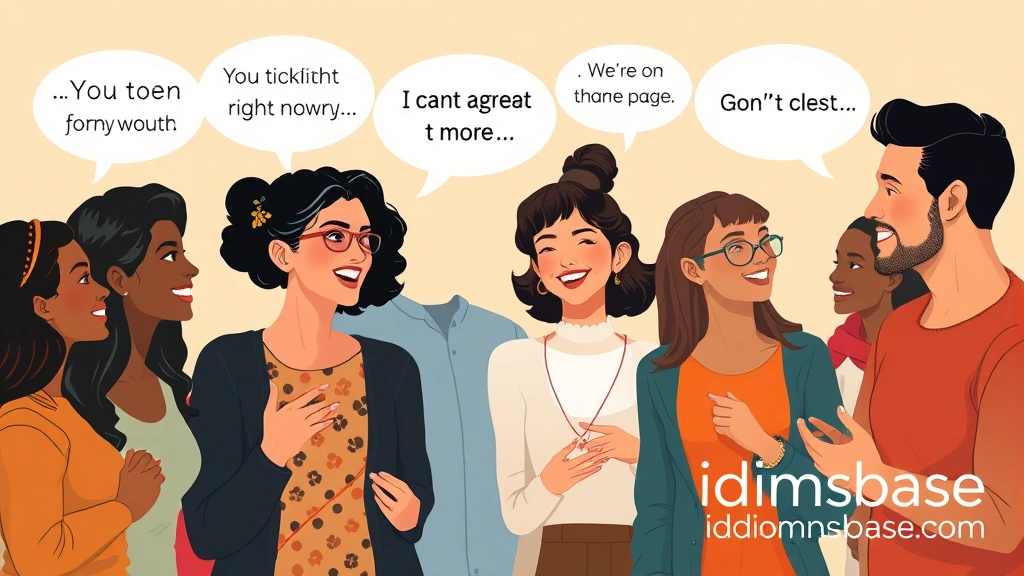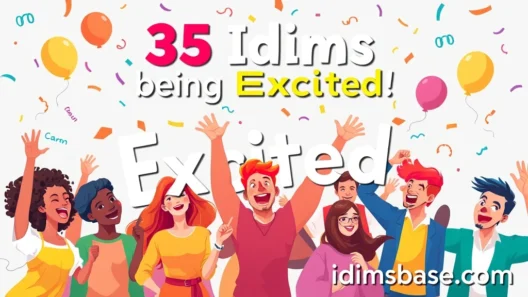Ever found yourself nodding along enthusiastically, wishing you had the perfect phrase to show just how much you agree? Or maybe you've been in a conversation where someone else dropped a brilliant idea, and "yeah, me too" just didn't cut it? Well, you're in the right place! English is bursting with vibrant, colorful idioms that let you express agreement with flair, wit, and a touch of personality. Forget plain old "yes" – let's dive into 35 fantastic idioms that will make your affirmations sing!
Expressing Agreement: More Than Just a Nod and a Smile
Agreement is the bedrock of good conversation, strong relationships, and successful teamwork. But how you express that agreement can make all the difference. Using idioms isn't just about sounding smart; it's about connecting on a deeper level, showing you're truly on the same page, and adding a dash of linguistic spice to your interactions. Ready to upgrade your agreement game? Let's go!
Idioms for Enthusiastic Agreement
These idioms are perfect for when you really, really agree!
- You can say that again!
- Meaning: I completely agree with you; what you said is absolutely true.
- Example: "This coffee is exactly what I needed." "You can say that again!"
- Tell me about it!
- Meaning: I strongly agree, often because I've experienced the same thing.
- Example: "This traffic is making me late." "Tell me about it! I've been stuck here for an hour."
- You're telling me!
- Meaning: I know exactly what you mean, and I completely agree.
- Example: "It's so hot today." "You're telling me! I'm melting."
- I'll second that.
- Meaning: I agree with what was just said; I support that statement or idea.
- Example: "I think we should order pizza." "I'll second that!"
- You took the words right out of my mouth.
- Meaning: You just said exactly what I was thinking or about to say.
- Example: "We should really focus on customer satisfaction." "You took the words right out of my mouth!"
- Hear, hear!
- Meaning: An exclamation of agreement, often used in formal settings or when applauding a speaker.
- Example: "We need more funding for education!" "Hear, hear!"
- Right on!
- Meaning: An informal way to express strong agreement or approval.
- Example: "That's a brilliant idea!" "Right on!"
- Spot on!
- Meaning: Exactly correct; perfectly accurate.
- Example: "Your analysis of the situation was spot on."
- Nailed it!
- Meaning: You've done or said something perfectly.
- Example: "That presentation was amazing, you nailed it!"
- Preach!
- Meaning: An informal, enthusiastic way to say you strongly agree, especially with a statement of opinion or truth.
- Example: "People need to be kinder to each other." "Preach!"
Idioms for General Agreement
These are great for everyday situations where you want to show you're on board.
- I'm with you on that.
- Meaning: I agree with your point or opinion.
- Example: "I think we should leave early to beat the rush." "I'm with you on that."
- That's what I'm talking about!
- Meaning: This is exactly what I wanted or expected; I strongly approve.
- Example: "We just secured the big deal!" "That's what I'm talking about!"
- You hit the nail on the head.
- Meaning: You've described the situation or problem exactly.
- Example: "The main issue is a lack of communication." "You hit the nail on the head."
- That's a fair point.
- Meaning: I agree that what you said is reasonable and valid.
- Example: "Maybe we should consider the budget more carefully." "That's a fair point."
- I couldn't agree more.
- Meaning: I completely agree; it's impossible for me to agree more than I already do.
- Example: "Customer service is paramount." "I couldn't agree more."
- My thoughts exactly.
- Meaning: I was thinking the very same thing.
- Example: "Perhaps we should reschedule the meeting." "My thoughts exactly."
- You've got a point there.
- Meaning: I agree that your argument or statement is valid.
- Example: "It might rain later, so an indoor venue is better." "You've got a point there."
- I concur.
- Meaning: A slightly more formal way to say "I agree."
- Example: "The evidence supports this conclusion." "I concur."
- Agreed.
- Meaning: Simple and direct way to state agreement.
- Example: "Let's meet at 7 PM." "Agreed."
- Sounds good to me.
- Meaning: I approve of the plan or suggestion.
- Example: "How about we start with a brainstorming session?" "Sounds good to me."
Idioms for Reluctant or Conditional Agreement
Sometimes you agree, but with a slight reservation or condition.

- If you say so.
- Meaning: I'll accept what you say, even if I'm not fully convinced or enthusiastic.
- Example: "It's definitely going to be sunny tomorrow." "If you say so."
- I suppose so.
- Meaning: I agree, but not with great enthusiasm or conviction.
- Example: "Do you think we should try again?" "I suppose so."
- Fair enough.
- Meaning: I accept your explanation or decision, even if it's not what I initially thought.
- Example: "I can't come because I have another appointment." "Fair enough."
- Point taken.
- Meaning: I understand and accept your argument or criticism.
- Example: "You need to be more organized." "Point taken."
- You've convinced me.
- Meaning: You've presented a strong enough argument to change my mind or gain my agreement.
- Example: "After hearing your presentation, you've convinced me."
Idioms for Affirming Understanding and Agreement
These show you not only agree but also understand the core issue.
- Exactly!
- Meaning: Used to emphasize complete agreement with what has just been said.
- Example: "The key is to focus on quality, not just quantity." "Exactly!"
- Precisely!
- Meaning: A more formal and emphatic version of "exactly."
- Example: "That's the fundamental problem we need to address." "Precisely!"
- That's it!
- Meaning: That's the correct answer or the exact point I was trying to make.
- Example: "So the goal is to increase efficiency?" "That's it!"
- You've got it.
- Meaning: You understand correctly; you've grasped the concept or instruction.
- Example: "So I need to submit this report by Friday?" "You've got it."
- That's the spirit!
- Meaning: Used to express approval of someone's positive attitude or determination.
- Example: "I'm going to give it my all!" "That's the spirit!"
Fun and Quirky Idioms for Agreement
Add some personality to your agreement!

- Amen to that!
- Meaning: I strongly agree, often used when someone expresses a wish or a strong opinion.
- Example: "I hope we get a long weekend soon." "Amen to that!"
- Couldn't have said it better myself.
- Meaning: Your statement is so perfect, I couldn't have phrased it more accurately or effectively.
- Example: "That speech perfectly captured the mood of the nation." "Couldn't have said it better myself."
- You hit the nail on the head.
- Meaning: You've identified the exact truth or core of the matter. (Yes, it's so good, it's worth mentioning twice!)
- Example: "The problem is not lack of effort, but lack of direction." "You hit the nail on the head."
- Right you are.
- Meaning: A slightly old-fashioned but charming way to say "You are correct."
- Example: "It looks like rain today." "Right you are."
- You bet!
- Meaning: An informal and enthusiastic way to say "absolutely" or "yes."
- Example: "Are you coming to the party tonight?" "You bet!"
FAQ Section
Q1: Why should I use idioms when I can just say "yes" or "I agree"?
A1: Great question! While "yes" and "I agree" are perfectly fine, idioms add color, nuance, and personality to your language. They show a deeper understanding of English, make your conversations more engaging, and can even build rapport by showing you're truly on the same wavelength as the other person. Think of them as linguistic spices – they make your communication much more flavorful!
Q2: Are these idioms appropriate for all situations?
A2: Not all of them, no. Some, like "Hear, hear!" or "I concur," are more formal and suited for professional or public speaking contexts. Others, like "Preach!" or "Right on!", are quite informal and best used with friends or in casual settings. Always consider your audience and the context of the conversation before choosing an idiom. When in doubt, a more general idiom like "I'm with you on that" or "My thoughts exactly" is usually safe.

Q3: How can I remember all these idioms?
A3: It can feel like a lot, right? The best way to learn idioms is by using them! Start with a few that resonate with you and try to incorporate them into your daily conversations. Listen for them in movies, TV shows, and podcasts. You can also create flashcards or try to use them in different sentences. Practice makes perfect, and soon, they'll feel natural!
Q4: Can using idioms make me sound more fluent?
A4: Absolutely! Native English speakers use idioms all the time. Incorporating them naturally into your speech and writing demonstrates a higher level of linguistic proficiency and makes you sound more like a native speaker. It shows you're not just translating words but truly thinking in English.
Q5: What's the difference between "You can say that again!" and "Tell me about it!"?
A5: Both express strong agreement, but with a slight difference in nuance. "You can say that again!" means "What you just said is so true, it bears repeating." It's a direct affirmation of the truth of a statement. "Tell me about it!" often implies that you also have personal experience with the situation being described, and you can relate to it deeply. It's like saying, "I know exactly what you mean because I've been there too!"
Key Takeaways
- Elevate Your Agreement: Move beyond simple "yes" to express agreement with more flair and precision.
- Context is King: Choose idioms appropriate for the formality of the situation and your relationship with the person you're speaking to.
- Practice Makes Perfect: The best way to master these idioms is to actively use them in your conversations.
- Sound More Native: Incorporating idioms naturally can significantly enhance your English fluency and understanding.
- Connect Deeper: Using these phrases shows you're truly engaged and on the same page, fostering better communication and rapport.
So, the next time you find yourself nodding along, ready to agree, pick one of these fantastic idioms and let your agreement shine! Which one will you try first? Let us know!






